As a breastfeeding mom, I’m constantly thirsty, and I carry around this water bottle all day as a reminder to guzzle lots. Most of us have plenty of water available…but do you really know if your water supply is safe?
Whether you live in a big city, in the burbs, or out in the wild woods, there is likely something pretty noxious in your drinking glass (don’t worry—it’s not all bad news. This problem actually has an easy fix).
The Trouble with “Safe” Water
In much of the developing world, water-borne maladies cause all sorts of disgusting (and often devastating) illnesses. The good news for us first-worlders is that municipal water systems are governed by strict regulations that ensure that most pathogenic microorganisms in our water are dead and can do us no harm.
The most common and effective agent for eliminating these nasties is chlorine. The bad news is that, while chlorine is deadly for tiny critters, it’s not exactly benign to larger life forms like humans. Removing chlorine from the water after it does its disinfecting job, but before drinking it, is ideal.
Unfortunately, chlorine is only one of the many chemical compounds found in modern water supplies. According to Forbes.com, there are over “6,000 toxins the EPA has not gotten around to regulating in municipal drinking water systems.”
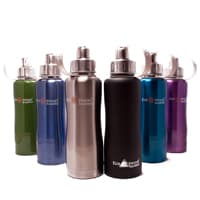 The fact is that no matter where you are on planet earth, there are all sorts of new, man-made chemical compounds floating in the water or blowing in the wind (wah!!). And evidence is mounting that at least some of these chemicals are endocrine disruptors, screwing around with our kids’ development and possibly causing cancer.
The fact is that no matter where you are on planet earth, there are all sorts of new, man-made chemical compounds floating in the water or blowing in the wind (wah!!). And evidence is mounting that at least some of these chemicals are endocrine disruptors, screwing around with our kids’ development and possibly causing cancer.
And its not just “city water.” (Here in New York City, everyone talks about how safe the water is and looks at me funny for having a filter on my sink and shower). People with wells and springs can be drinking any number of pollutants from farm runoff or industrial waste.
Bottled Water Isn’t Safe Either
You probably have already heard this, but many of these gross chemicals may also show up in expensive bottled water. In fact, the Environmental Working Group found “38 pollutants in 10 brands of bottled water, including chemicals linked to cancer.”
The Question of Fluoride, and an Answer from Harvard
Fluoride supplementation is controversial.
Just today, The Harvard Public School of Health reported that fluoride “adversely affect[s] cognitive development in children,” causing as much as a 7-point lower IQ.
For these reasons, I recommend filtering out fluoride. There is evidence that vitamin D may help prevent cavities, so I would recommend that if you aren’t doing it already. The one pediatricians typically recommend (Tri-Vi-Sol) contains artificial colors and flavors. We use these.
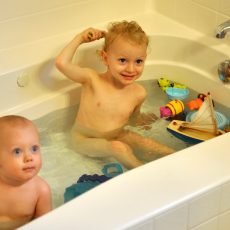
How to Clean Your Water: Get a Filter
There are many types of water filtration systems out there, from whole-house systems that filter every drop that comes through your pipes, to the pitcher filters that you put in your fridge (meaning your water is sitting in plastic, but that’s another issue).
While whole-house systems can be great, they can also be pricey and require complicated installation. Pitcher filters aren’t particularly effective, so I use two affordable filters in my home. I have a three-stage filter system beneath my kitchen sink, which we use for all of our drinking and cooking needs. I also have a shower-head filter that helps keep us from soaking in chlorine (It should be noted that your skin can absorb more toxins that your digestive tract, and when a chlorine-contaminated shower runs, the chlorine becomes vaporized and airborne). I have a detachable shower head on a hose, so I even fill the kids’ baths with filtered water (most of the time, anyway).
We now sell the same water filters I’ve been using for years on our website. Check them out here.
Stay sane,
If you liked this post, sign up for our newsletter to be alerted when we publish new content like this!

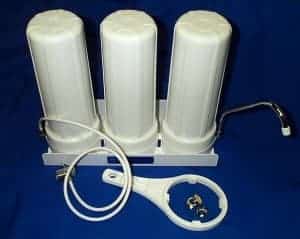




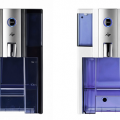
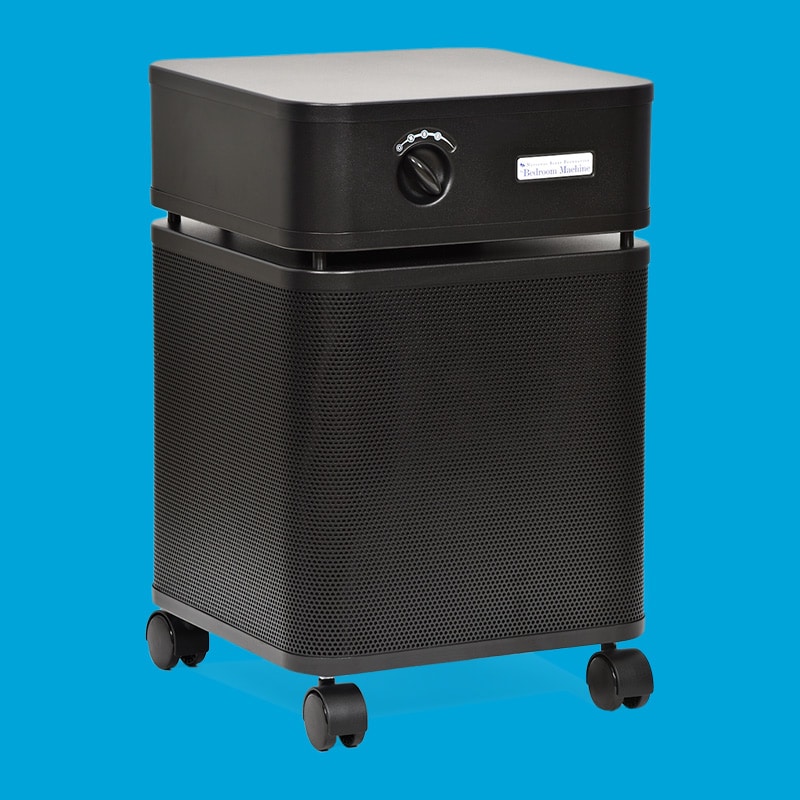
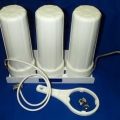

Maryam says
Hi , thanks for you wonderful website , it’s a god sent for me as a first time mom who is always worried to do things wrong… I’ll appreciate if you let me know which brand is this water filter , I’m in Canada and I prefer to find it here . Also do I still need to boil the filtered water for formula preparation?
Melissa says
can you please tell me what the brand names are for these filtration systems and the shower filter attachment, thanks.
Stephanie says
Is the clearly filtered water pitcher effective at removing medicines as well? Thx for all your research and hard work! I always look forward to your recommendations.
Maia James says
Unfortunately, no, I don’t believe this pitcher filters for trace pharmaceuticals. For this reason, the ideal is still a filter that attaches to your faucet (either over- or under-counter).
Guadalupe Ramos says
I feel that it is , because I did the test on my water in my Britta filter pitcher, and it was all 2 thumbs up, it passed the inspection. I also bought 4 more back up filters for when it’s time to change the filter, I have them ready to change them out right away . Thank you for all of your information tho, I would like to buy the shower filter anyways , here in the next month or sooner .
Jane says
I agree so much with you Maia. We really need water filter. You can’t be sure 100% with tap water and bottled water. It’s much better to use water filter and drink your worries away.
Amy says
Do the 3 way filter system have replacement cartridges? OR do they only last so long then you have to replace the whole system?
John Goss says
Hi Amy,
John here…
Yes, we have replacement filters. No need to replace the entire housing. The housings will outlast any of us and are built to a standardized size, so whenever improved filtering technology comes along, the newer/better filters will work in the housing.
Depending on how much water you use, we recommend changing filters every 1-3 years. They are super easy to replace.
Ley me know if you have any other questions.
john@gimmethegoodstuff.org
Debbie says
I have read that the only way to remove fluorine is to distill the water. How much fluorine is removed with the 3 part filter?
John Goss says
Hi Debbie,
Fluoride is what is added to most municipal water systems….not fluorine. Distillation will remove most of the fluoride. So do our Fluoride filters. From my research I do not recommend drinking distilled water often. with a bit of research you will find that clean, properly filtered water is much better for you than distilled water. Also, If you buy distilled water it almost always comes in a plastic bottle. Distilled water can quickly start to dissolve the plastic from the bottle into the water. This means that you will be water with dissolved plastics. Phthalates ore one of the chemicals you will be drinking. Not good at all!
https://gimmethegoodstuff.org/store/under-counter-three-stage-water-filter/
Best,
John
Nicole says
Thank you so much for your wonderful website and the research that you are doing! While searching for a filter, I stumbled upon Berkley filters. Their specs are pretty amazing.
http://www.berkeyfilters.com/berkey-answers/performance/filtration-specifications/
Was wondering how the water filtration/purification results compare to your filters?
Thank you so much!
Jessica says
I would also love to hear feedback on the Berkey. It is what we use at home.
Jane says
Hi Maia,
Thank you so much for all the work and research you do. Providing a healthy, non-toxic life for my little one is so hard and you make it much more turn-key. Question re filter – we are looking for a point-of-entry filter so that we don’t have to get individual filters for our fridge, sinks, showers, baths, and icemakers — can the 2-stage filter that you have on your site work as a POE filter as well? We live downtown Charleston, so one of the oldest cities in the US where it also floods ALL THE TIME — and many of the pipes in the city are still lead– so, I am completely unnerved when I think about what we are drinking and bathing in each day. Anxious to get a great filter in place.
Thanks!!
Martha says
I have the same question! And if not this one, is there another whole-house system you’d recommend?